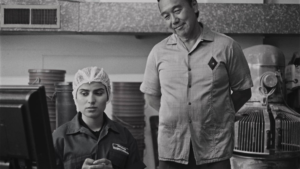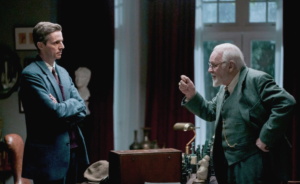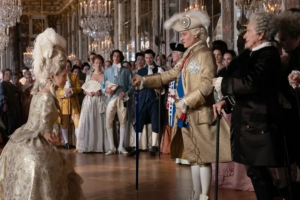Reviewed by GREG KING
DIrector: Petra Biodine Volpe
Stars: Marie Leuenberger, Maximilian Simonischek, Sybille Briner, Rachel Braunschweig, Nicholas Ofczarek.
Suffragette – Swiss style?
This crowd pleasing light drama from Switzerland is a bit like Pride and Made In Dagenham as it explores how a social movement can bring about progressive change and also a change in entrenched attitudes. In 1971, women in Switzerland were still denied the right to vote, making this one of the last countries in the industrialised world to recognise their rights. Switzerland was still an ultraconservative country, with old fashioned misogyny and traditional patriarchal rules governing society. Women couldn’t get a part time job without the approval of their husbands. A referendum proposal to allow women the right to vote was being discussed. In the bigger cities like Zurich there were marches and protests.
However, in the quiet fictitious provincial Alpine village where our heroine Nora (played by Marie Leuenberger, from Amnesia, etc) lives, any such agitation towards sweeping social change is met with brusque disapproval. Nora is a mousy housewife who looks after her two sons, her husband Hans (Maximilian Simonischek), and her cantankerous old father-in-law who is set in his ways and has nothing nice to say about his family. Hans works in the local timber mill and has just recently received a small promotion. He is basically pressured by the town elders to conform to the expectations of the village. Nora wants to return to work with a part time job in a travel agency, but Hans forbids it, which he can do so according to the law.
Nora reluctantly gets involved in the burgeoning local women’s movement, and with the help of a few like-minded women she slowly finds a sense of empowerment and brings about a change in attitude. Hans privately says that he supports the idea of women having the right to vote, but when it comes to publicly voicing his support he backs away. This creates further tension within the household, and Nora and Hans find their marriage at a crossroads. The women go on strike to make their point about oppression and subjugation, forcing the menfolk to carry out all the usual domestic chores.
Leuenberger brings a mix of quite strength and passion to her performance. Simonischek brings nuances to his performance that makes his Hans more of an ambiguous character rather than an outright prig and misogynist. Sibylle Briner is good and brings a wicked sense of humour to her role as the sassy, elderly widow Vroni, who has long sense given up caring what people think about her and embraces Nora’s cause with energy and passion.
The Divine Order is based on real events that brought about a change in Switzerland in the 1970s, and its themes are still quite relevant even today. An opening montage sequence shows the powerful social movements of the 60s that brought about change in the US, and which inspired similar activism in other countries.
The film has been written and directed by Swiss filmmaker Petra Biodine Volpe (who wrote Heidi, which is internationally the most successful Swiss film of all time at the box office), and it is earnest but modest in its ambition. This is a very busy film with several subplots that also suggest the prevailing attitudes of the time. One subplot explores the plight of Nora’s sister-in-law Therese (Rachel Braunschweig) and her drunken husband Werner (Nicholas Ofczarek) who are struggling with the family farm. The Divine Order is a film of modest ambition and lacks any grand sense of drama. There is plenty of humour which broadens its appeal.
Veteran cinematographer Judith Kaufman (Sanctuary, etc) eschews the usual gorgeous visuals of the alpine setting, giving the film a rather visually bland look.
★★★




